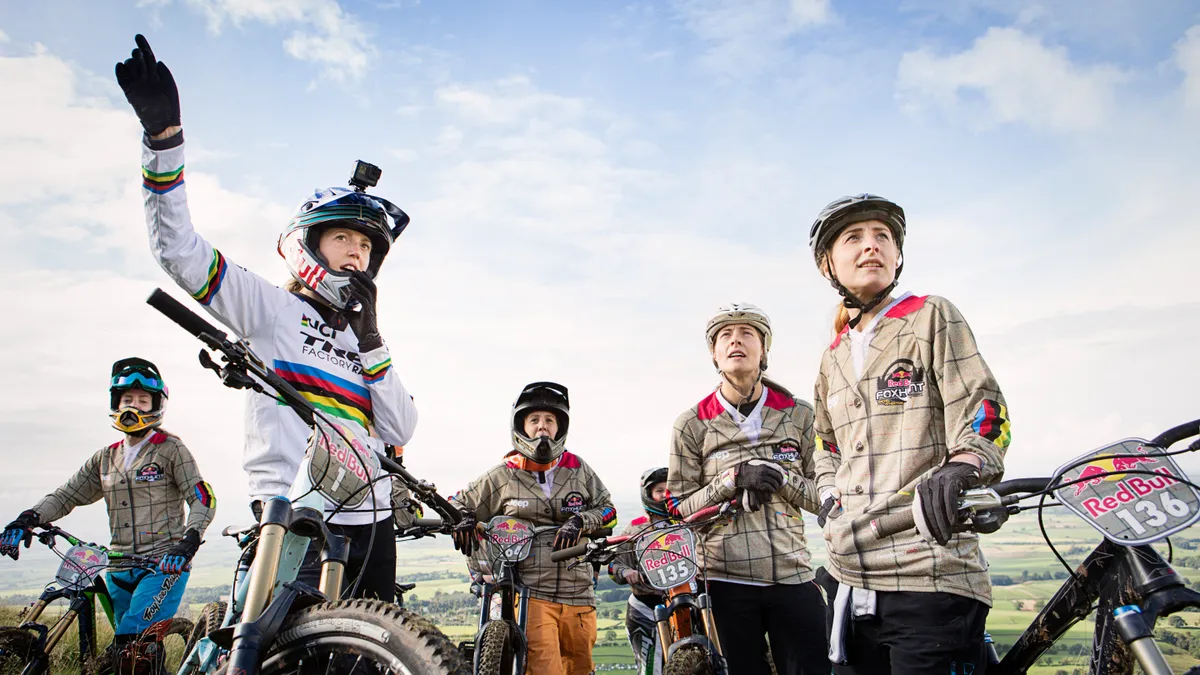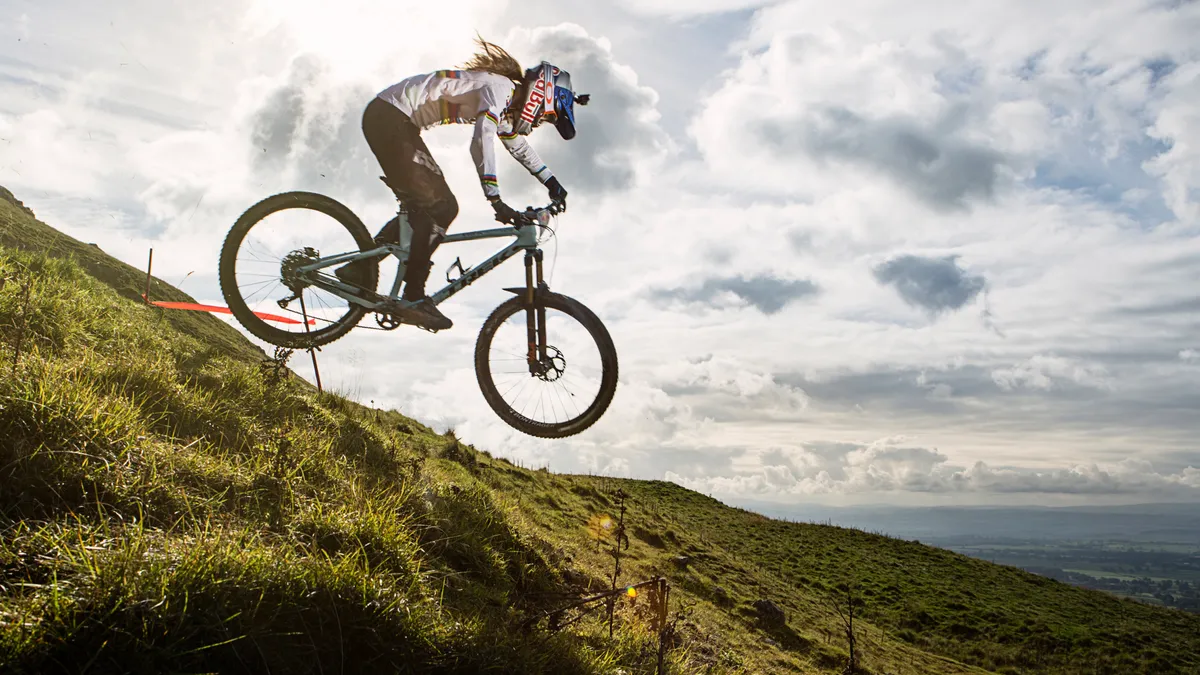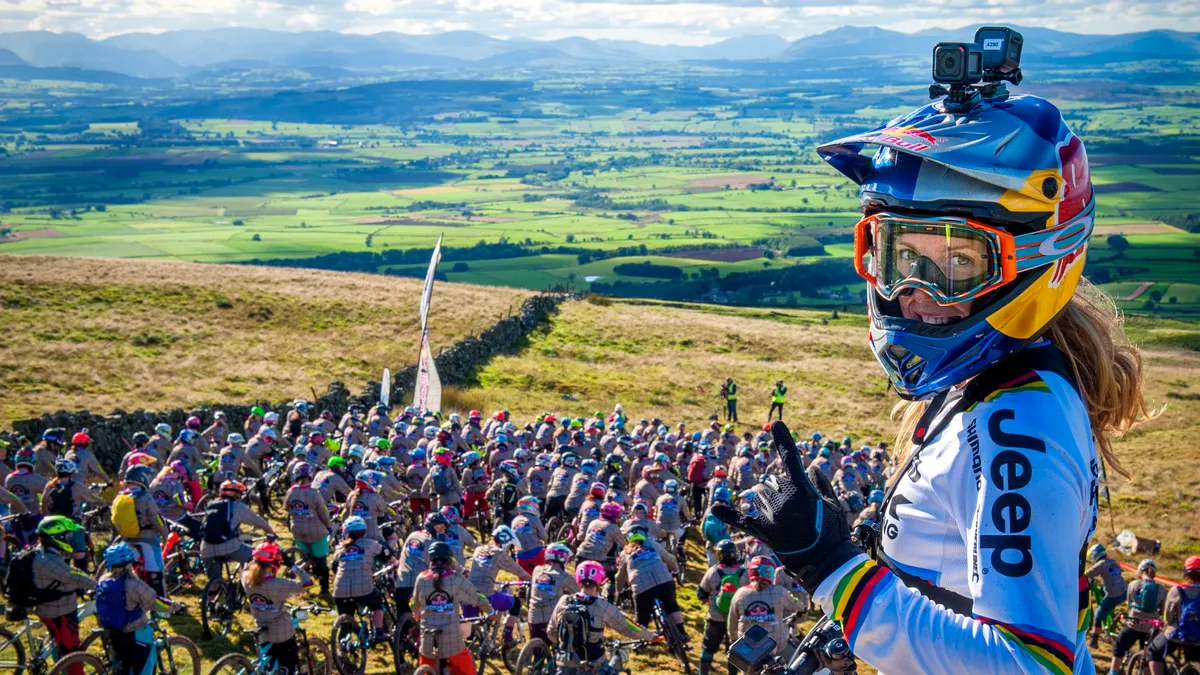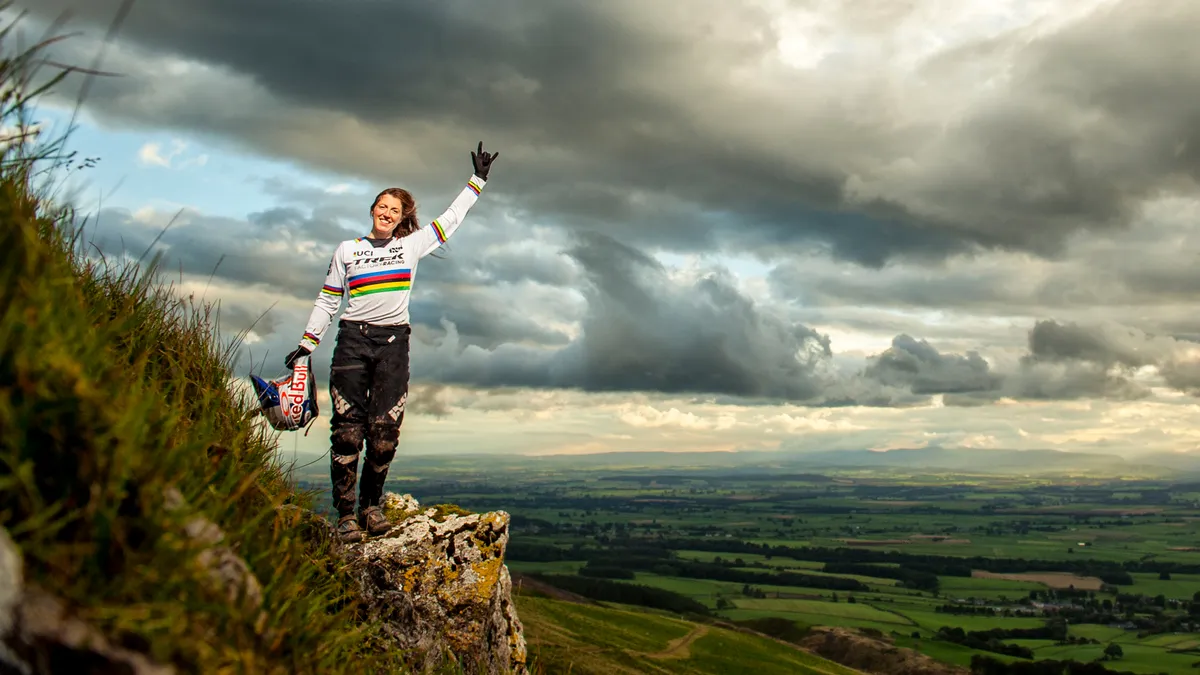Get your season dialled from start to finish with tips from the multiple World Champion and World Cup Champion downhill racer Rachel Atherton.
Whatever your race discipline, how you perform come race day is everything to do with how you prepare. When you’re facing a whole season of events, consistent performance is crucial. We spoke to the woman who’s managed to complete a ‘perfect season’ in downhill MTB, winning every single round and the World Champs to boot. If anyone knows how to put in a consistently great performance, it’s her.
- Best women's mountain bikes: how to choose the right bike for you
- Rachel Atherton: leading the way
- Exercises and tips for avoiding back pain when cycling
On Sunday, Atherton chased the field in this year's Red Bull Foxhunt, a mass-start downhill mountain bike race that saw the World Champion attempt to beat over 250 women down a race course in England's Lake District, and she took a few minutes out from sharing advice and chatting with the riders taking part to give us the benefit of her lifetime of race experience.
1. Take each race at a time
"This is a big thing.” Atherton tells BikeRadar. “You need to prepare perfectly, prepare for each race, and take each race on its own.”
This means not only ensuring that you are in the best condition you can be for each event, but also that you’ve taken the time to look at the specifics of that event and what you need to do to be ready for it. Every course is different, terrain can vary, and elements like weather conditions can have a big effect on performance.
2. Don’t get complacent
By the end of the 2016 race season Atherton had won 14 races in a row. Her dominance has made her the first rider in the history of downhill MTB to win every World Cup in a season, but you’d be wrong to think that she doesn’t work hard for every single event.
“When you get on a winning streak, don’t get complacent or think ‘I’ve got this, I’m way ahead'", she advises. “I go into every race thinking I haven’t done enough training and that everyone else is so good. I guess a little bit of it is knowing that I need to not feel confident to do well.”

3. Experience is key
Atherton first started racing BMX as a child, and, as she puts it, racing is in her blood. This has given her a wealth of experience both in what to expect on race weekends and how to manage her own physical and mental performance for races.
I used to work with psychologists and keep a diary and everything would go in it, but now I’ve been doing it so long I just do it
“I’ve been racing for so long now, I know exactly how I feel. Having consistency is I think a lot to do with experience.”
Not all of us have been racing since childhood, but if you want to improve then a good way is entering as many races as you can, which will certainly help improve your race craft, hone your pre-race prep, and help you to learn about your own performance and recovery needs.
4. Prepare mentally
Mental preparation before an event can be just as crucial as physical preparation. You need to be able to get yourself into the right place in your head to ride to the best of your abilities, and this takes work too.
“I used to work so hard on [mental preparation],” Atherton comments. “I used to work with psychologists and keep a diary and everything would go in it, but now I’ve been doing it so long I just do it.”
Keeping a diary of what you do and how you feel over a race weekend, and during the race itself, can help you identify particular areas of stress. There are then many tools available that can help you deal with these stressors. Of course, an element of stress is important as it provides the adrenaline rush and focus that can give you the drive to win.
“Everyone asks me ‘do you not get scared or nervous?’ I get nervous at every race, and I doubt myself, but there are things you can do [to address that].” Atherton advises that preparation and practice are critical factors.
5. Practice, practice, practice
“If you know that you’ve done something in the past, or practised it, you can’t really argue with that,” says Atherton, when asked about dealing with nerves on the track.
Confidence in your abilities on race day comes from practice in the days, weeks, months and even years before. The more terrain you’ve ridden, features you’ve practised, or conditions you’ve cycled in, the more confident you’ll be in your ability to handle what lies ahead on the track.
It can be tempting to just practice what you’re comfortable doing, but the greatest gains are to be made working on your areas of weakness. So if wet roots are your nemesis, head to the woods in winter.
6. Set yourself a race-day routine
“A lot of riders have a set routine, and I rely heavily on mine. Going to sleep at a certain time, waking up, having a Red Bull, getting on the turbo; it’s been the same for 10 years. You do it on autopilot, you don’t have to think.”
Getting your pre-race routine dialled can ensure that you’re rested, fuelled and ready to race, without having to spend precious head space thinking about it on the morning of the event. There’s a degree of trial and error here as you’ll have to work out what works for you, but as a general rule an early night and a good breakfast are a good start.

7. Use the off-season wisely
“I love it when people ask ‘so are you just chilling out until the racing starts again in six months time?’ I think now more than ever, the off-season is key. It’s really important to have time off and switch off so you can turn it back on again. I want to be stronger and fitter and that’s a good motivator. All the girls train so hard, and the more I win the more they train. The off-season is a little competition in itself, to see who’s training the hardest on Instagram.”
The Instagram comment is a useful one: motivating yourself to train through the winter can be tough, but having people to train with is a proven way to stick to the plan. While training together in person is great, social media can also keep you and your training partners connected. Additionally, there are various apps such as Strava. FitStar and UnderArmour Record where you can build an online community and set group goals, wherever you are in the world.
8. Listen to your body
Performing well across a season is as much about knowing when to rest and recuperate as it is about training hard and going for it. Overtraining is counterproductive, and giving your body time to recover will mean greater gains down the line.
As Atherton tells us, knowing when to rest is about experience and knowing how your body behaves: “If I come home from a race and I’m tired, and I know that I’m not going to make any gains in the gym in a week or two, I’m going to rest and not override. I think it’s about knowing what works for you, and obviously it’s different for everyone.“
9. Enjoy it!
You need serious dedication and determination to perform consistently over a season, and as Atherton has mentioned, a good season starts with a good off-season. That’s a big commitment to make, and as with anything, it’s got to be fun if you’re going to stick with it.
Enjoying it is clearly not an issue for Atherton. “I love racing!” she smiles. “I pretty much live for it. That five minute race run at the end of the weekend, that’s the bit I enjoy. Once I’m there, I can relax. I know what I’m doing, I know how to race. In fact, if I could always just do race runs I’d be happy!”
Not all of us can win as consistently as Atherton, but whether you’re chasing your personal best or a spot on the podium, the enjoyment factor shouldn’t be overlooked.




